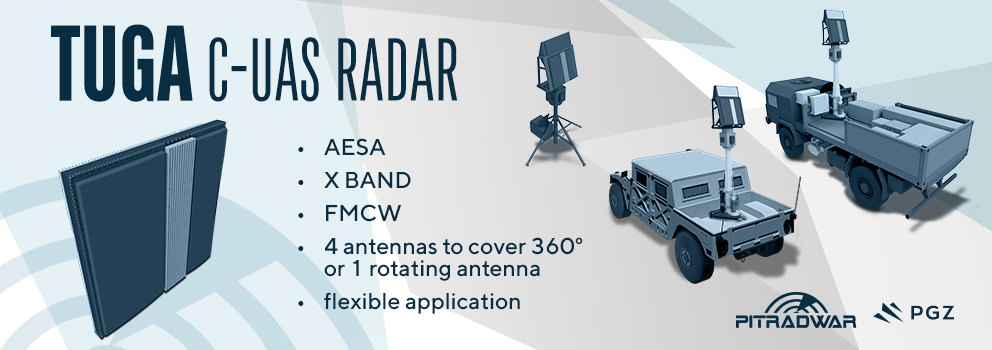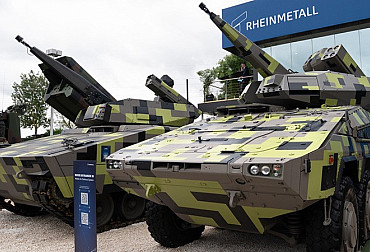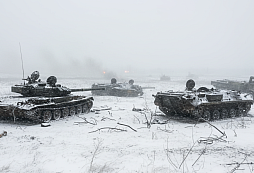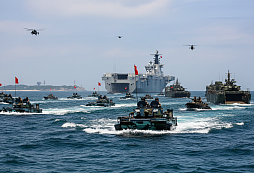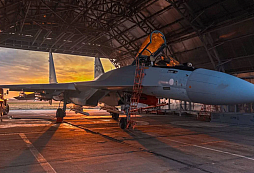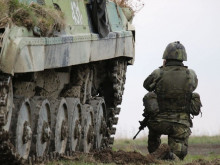The Czech Army concludes its nearly ten-year deployment in the EUTM mission in Mali
The Army of the Czech Republic will end its nearly ten-year deployment in the EUTM mission in Mali, West Africa, on 31 December 2022. During that time, it has trained more than 22,000 soldiers and prepared three hundred army instructors. Our Army has even commanded the EUTM training mission twice with success. The Czech Republic is also leaving the country as such, closing its embassy there at the end of the year.
On Friday 16 December at noon, Czech Brigadier General Radek Hasala handed over command of the EUTM Mali mission to his Spanish successor, Brigadier General Santiago Fernandez Ortiz-Pepis. This effectively closed the Czech participation in the EU training mission. The ceremony took place in the capital Bamako in the presence of dozens of guests, including representatives of the Malian authorities, military and diplomats.
 Picture: Brigadier General Radek Hasala during the handover ceremony for the EU training mission | EUTM Mali
Picture: Brigadier General Radek Hasala during the handover ceremony for the EU training mission | EUTM Mali
Hundreds of courses for thousands of soldiers
Since its inception in 2013, EUTM Mali has organised a total of 430 courses for a wide range of skills and ranks of Malian Armed Forces soldiers, which in recent years have mainly focused on training instructors to maximise the self-sufficiency of the Malian Army. "With regard to the established capabilities of the Malian Armed Forces to plan and conduct military and professional training independently, the EU training mission has fulfilled one of the key tasks," said Brigadier General Radek Hasala, EUTM Commander, assessing the Czech participation.
"In view of the developments in Mali and the capabilities of the Malian Armed Forces, all operational training of Malian soldiers has been suspended and the mission has focused mainly on education, advice and specialised training," said Lieutenant General Josef Kopecký, Commander of the Operations Command, adding that EUTM Mali will undergo a major internal reorganisation in the future, which will include the centralisation of forces in the capital area and a significant reduction in the number of forces. "The mission's main efforts will focus on strategic advice and training," he added.
Experience for 1 200 Czech soldiers
More than 1 200 Czech soldiers have been through the EUTM mission from 2013 to this December, some repeatedly and most with previous experience of foreign deployment. Initially, there was a modest team of around forty people, which has grown over the years to a task force of 120 soldiers.
Some of them worked in the mission command and headquarters, others provided security for the EUTM headquarters in Bamako or the training camp in Koulikoro. Other members of the Czech Army then participated in the training of the local armed forces in cooperation with French, Malian, German and Spanish units. Brigadier General Radek Hasala was historically the second Czech commander of the mission (21 June 2022 - 16 December 2022). The first was Brigadier General František Ridzák, who commanded the mission from 12 June 2020 to 12 January 2021.
 Picture: From EUTM Mali | EUTM Mali
Picture: From EUTM Mali | EUTM Mali
According to Lieutenant General Josef Kopecký, the Czech participation in Mali has confirmed the good name of our Army: "In less than ten years of deployment, we have managed to accomplish all the tasks and our soldiers have gained some valuable combat experience. In a completely different environment from Europe, a number of members of the Czech Army have been trained here and have proved that they are capable of working in different conditions and performing different tasks."
The soldiers themselves perceive the engagement in the EUTM mission in Mali as a valuable experience: "Being an instructor and cooperating in an international training environment was a great experience for me. I spent almost a year in Mali, training Malian soldiers at different levels - from privates to captains. The soldiers came to us with the clear objective of gaining European knowledge and experience that they could then use in practice. That is why the training and cooperation with them always went smoothly and the soldiers went back to their units satisfied," revealed one of the Czech soldiers.
 Picture: From EUTM Mali | EUTM Mali
Picture: From EUTM Mali | EUTM Mali
The Sahel (Mali, Mauritania, Senegal, Burkina Faso, Niger, Chad, Sudan and Ethiopia) has long been the place of the fastest development of terrorist groups in the world, and therefore remains a priority for the Czech Republic. "This is a very troubled area that Europe cannot afford to leave. We are now looking for ways to continue to operate in the Sahel or the wider West African region," said Defence Minister Jana Černochová.
The departure of Czech soldiers from Mali is a logical step
The situation in Mali has been politically complicated for the Czech Republic, as the editors of CZ DEFENCE have written about several times in the past, and the Czech Government was faced with a dilemma as to whether it made sense to continue to operate in Mali, where the Czech Army had been present since 2013, almost from the very beginning, when the civil war between the central Government, separatist Tuaregs and various Islamist groups affiliated with Al-Qaeda and, in the following years, the so-called Islamic State began. At this time, anti-government militias were in de facto control of the northern, mainly desert areas of Mali and expanded southwards, which was eventually stopped with the help of foreign missions, and the Malian Government regained control of the important central Malian towns of Timbuktu and Gao, which it now firmly controls. However, the sparsely populated areas to the north of these cities no longer do.
Until 2020, the Malian Government had friendly relations with Western countries and, from a military point of view, the involvement of European special forces was appreciated by the Malian armed forces, as they were able to stabilise the situation and helped to push terrorist and separatist forces into less important areas. However, this has still not been enough to stop the violence, and there have been two coups in the country in 2020 and 2021, and Mali is currently ruled by a military junta that considered the previous government incompetent precisely because of its inability to stop the violence, which it used as an excuse to remove it from power.
This junta has gradually begun to turn away from its traditional allies, especially France, with which the Republic of Mali is strongly linked because of its colonial past, and has begun to lean towards the Russian Federation, which is a very problematic issue for European countries from a geopolitical point of view (especially after the Russian invasion of Ukraine). In addition, mercenaries from the so-called Wagner Group are increasingly operating in Mali, and they are also accused of human rights violations during the Russian-Malian operations, which is also a moral problem for Western countries.
Because of the active Russian presence in Mali, France has refused military assistance to the current Malian Government, and Germany, which sent around 1 000 troops to Mali as part of the MINUSMA mission, most of whom are based in the city of Gao, considered something similar in August this year. Germany has had disputes with the Malian Government over the authorisation of overflights and the presence of Russian forces at Gao airport. From a German point of view, major problems could arise if the Malian authorities restricted the freedom of movement of the troops and UN reconnaissance aircraft, and if human rights violations continued, Germany could reach the point where it could not justify its participation in MINUSMA. The political situation described above logically led to a reluctance to extend the mandate in Mali for the Czech Army.
